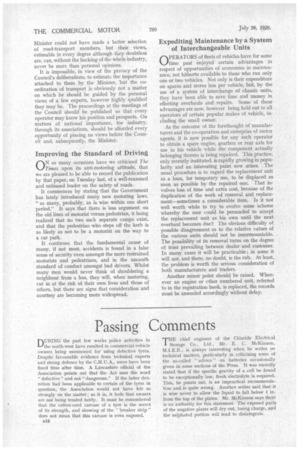Secrecy of the Advisory Council
Page 35

Page 36

If you've noticed an error in this article please click here to report it so we can fix it.
WHAT is going on behind the stage of the Transport Advisory Council? This question is being asked by many thinking members of the road-transport industry, who fear that recommendations on subjects of vital importance to them are being •Made by the Council to the Minister of Transport without their being affordei:i the opportunity of stating their views. The Council was appointed, early in 1934, by the Minister. under Section 46 of the Road and Rail Traffic Act, 1933, to advise him concerning means for transport "and their co-ordination, improvement and development." Little Iris, however, been heard of its work, which, for some unknown reason, appears to be carried out unAer conditions of secrecy, although the subjects deiegated to it for consideration are of outstanding moment to every road-transport operator. It is probable that the Minister could not have made a better selection of road-transport members, but their views, estimable in every degree although they doubtless are, can, without the backing of the whole industry, never be more than personal opinions.
It is impossible, in view of the privacy of the Council's deliberations, to estimate the importance attached to them by the Minister, but the coordination of transport is obviously not a matter on which he should be guided by the personal views of a few experts, however highly qualified they may be. The proceedings at the meetings of the Council should be published so that every operator may know his position and prospects. On matters of national importance, the industry, through its associations, should be afforded every opportunity of placing its views before the Council and, subsequently, the Minister.
Improving the Standard of Driving
ON so many occasions have we criticized The Times upon its anti-motoring attitude', that we are pleased to be able to record the publication by that paper, on Tuesday last, of a well-reasoned and unbiased leader on the safety of roads.
It commences by stating that the Government has lately introduced many new motoring laws, "as many, probably, as is wise within one short period." It says that there is less argument on the old lines of motorist versus pedestrian, it being realind that no two such separate camps exist, and that the pedestrian who steps off the kerb is as likely as not to be a motorist on the way to a car park.
It continues that the fundamental cause of many, if not most, accidents is found in a false sense of security even amongst the more restrained motorists and pedestrians, and in the uncouth standard of conduct amongst bad drivers. Whilst many men would never think of shouldering a neighbour from a bus, they will, when motoring, cut in at the risk of their own lives and those of others, but there are signs that consideration and courtesy are becoming more widespread.
Expediting Maintenance by a System of Interchangeable Units
OPERATORS of fleets of vehicles have for some time past enjoyed certain advantages in respect of opportunities of economies in maintenance, not hitherto available to those who run only one or two vehicles. Not only is their expenditure on spares and stores less per vehicle, but, by the use of a system of interchange of chassis units, they have been able to save time and money in effecting overhauls and repairs. Some of these advantages are now, however being held out to all operators of certain popular makes of vehicle, including the small owner.
As the outcome of the forethought of manufacturers and the co-operation and enterprise of motor agents, it is now possible for any such operator to obtain a spare engine, gearbox or rear axle for use in his vehicle v.thile the component actually belonging thereto is being repaired. This practice, only recently instituted, is rapidly growing in popularity and an interesting point now arises. The usual procedure is to regard the replacement unit as a loan, for temporary use, to be displaced as soon as possible by the repaired one. That involves loss of time and extra cost, because of the duplication of the work of removal and replacement—sometimes a considerable item. Is it not well worth while to try to evolve some scheme whereby the user could be persuaded to accept the replacement unit as his own until the next overhaul becomes due? The obvious difficulty of possible disagreement as to the relative values of the various units should not be insurmountable. The possibility of its removal turns on the degree of trust prevailing between dealer and customer. In many cases it will be practicable; in some it will not, and there, no doubt, is the rub. At least, the problem is worth the serious consideration of both manufacturers and traders.
Another minor point should be raised. Whenever an engine or ether numbered unit, referred to in the registration book, is replaced, the records must be amended accordingly without delay.




































































































